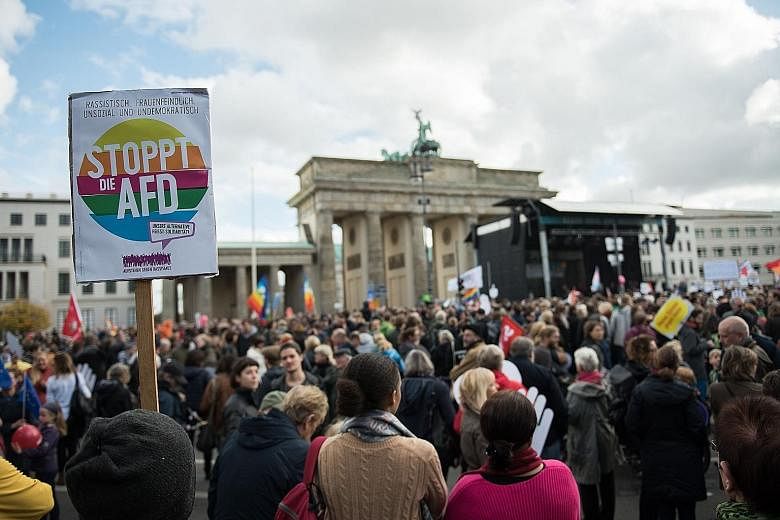BERLIN • German civil rights organisations are mobilising against the newly elected far-right Alternative for Germany (AfD) party and other more hardline groups, vowing to avert the even stronger rightward lurch seen in neighbouring countries.
Thousands of protesters were expected in the eastern city of Dresden yesterday when the anti-Islam Pegida movement celebrates its third anniversary.
Pegida - Patriotic Europeans Against the Islamisation of the West - has seen dwindling crowds since early 2015, with the AfD absorbing some of its supporters.
The AfD rails against what it calls the "Islamisation of Europe" and denies it is racist.
It won almost 13 per cent of the vote in the Sept 24 national elections, making it the third-largest party in the Bundestag, or Lower House of Parliament, and the first far-right party to win seats in more than half a century.
Exit polls showed that 60 per cent of AfD voters cast a "protest vote", with many angry at Chancellor Angela Merkel's 2015 decision to allow in more than a million mainly Muslim migrants.
Experts say the party's rise is also part of a global trend that has brought right-leaning parties or leaders to power in Poland, Hungary and, most recently, Austria.
Germany's mainstream parties have said they will not work with the AfD at a national level, but activists say they must stake out clear resistance to AfD comments on Islam and other issues in Parliament, and 14 out of 16 state legislatures.
"We've seen a strong and growing movement of people resisting the AfD in recent months in big cities, in small towns, and now we need that movement on a national scale," said Ms Nora Berneis of Aufstehen gegen Rassismus, or Standing Up Against Racism.
AfD has drawn sharp criticism from a German journalists' group for seeking data on the ethnic backgrounds and political views of journalists who want to cover its party conference in December.
Mr Christoph Schott, of the global activist group Avaaz, said more than 500,000 people had signed an open letter to the AfD, rejecting the party's "xenophobic" and "racist" messages.
Police data showed a 14 per cent rise in right-wing extremist violent acts last year, and that anti-Semitic crimes rose 4 per cent to 681 in the first eight months of this year.
The AfD's entry into Parliament has triggered a long-overdue dialogue about what went wrong during the unification of eastern and western Germany in 1990, said Ms Michaela Glaser of the German Youth Institute, a non-profit research association.
"One silver lining... may be that things that were hidden before have become visible.
"And only if something has been articulated can it be addressed," she said.
REUTERS

